牛津译林英语七年级下册 Unit 2 Neighbours Revision (共37张PPT)
文档属性
| 名称 | 牛津译林英语七年级下册 Unit 2 Neighbours Revision (共37张PPT) |
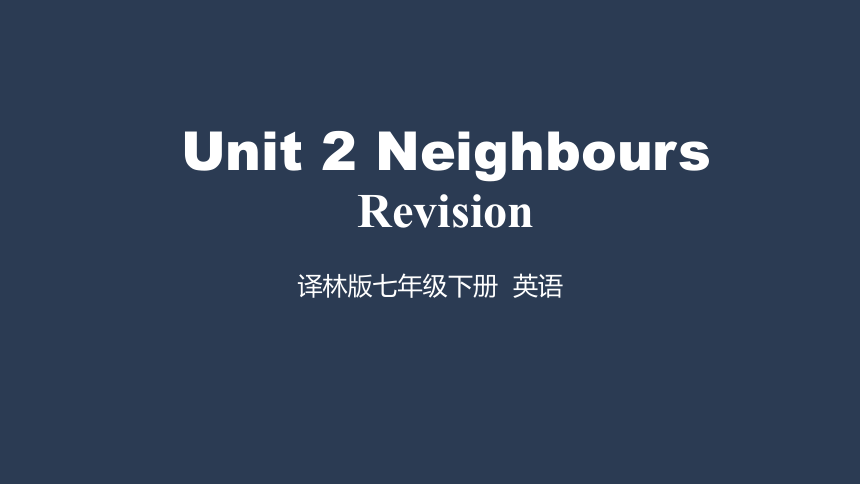
|
|
| 格式 | zip | ||
| 文件大小 | 3.2MB | ||
| 资源类型 | 教案 | ||
| 版本资源 | 牛津译林版 | ||
| 科目 | 英语 | ||
| 更新时间 | 2020-04-30 00:00:00 | ||
图片预览


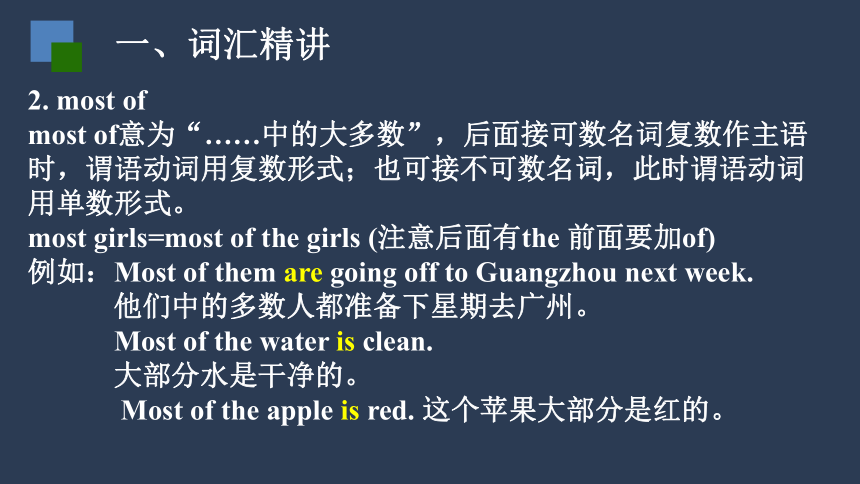


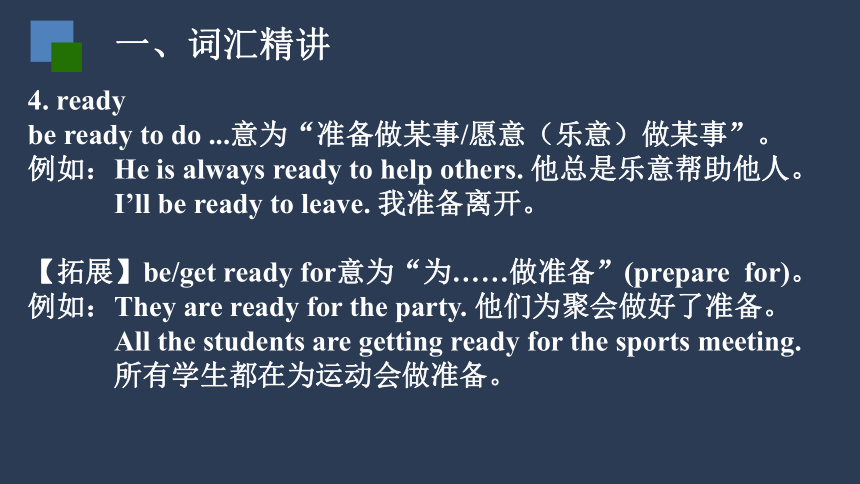
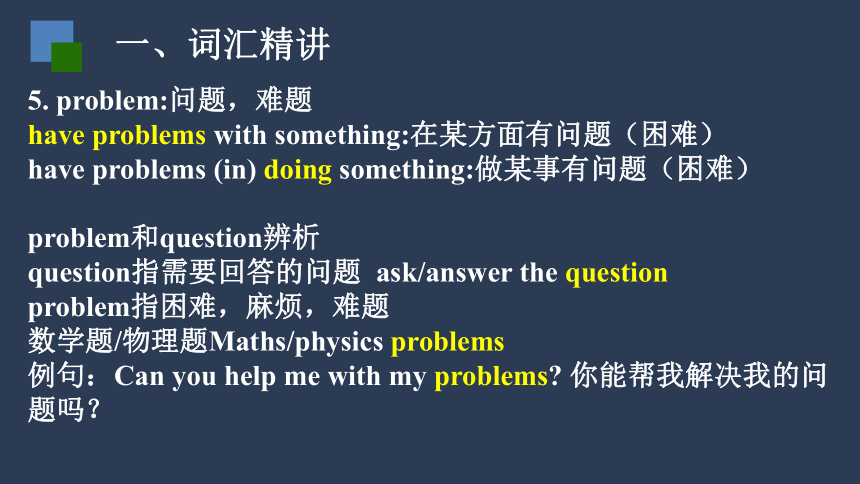
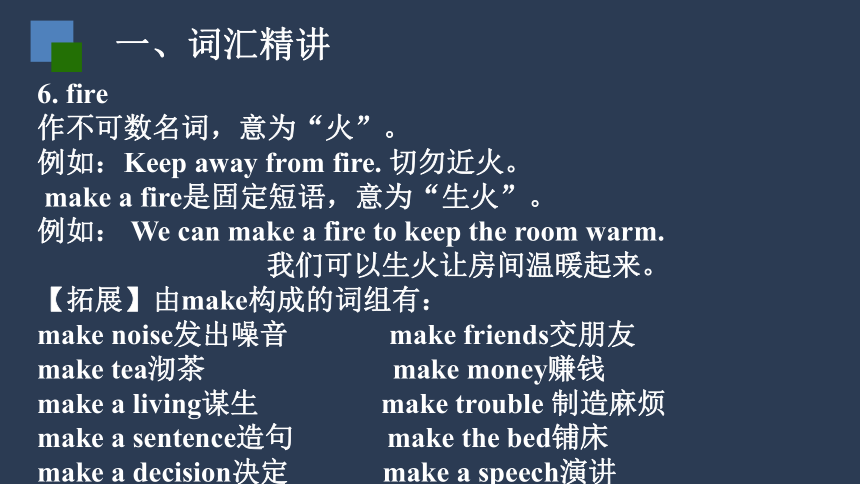
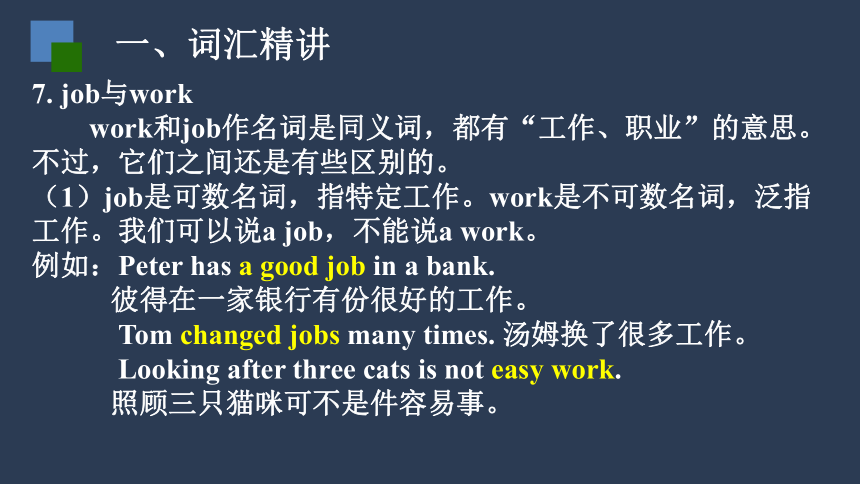
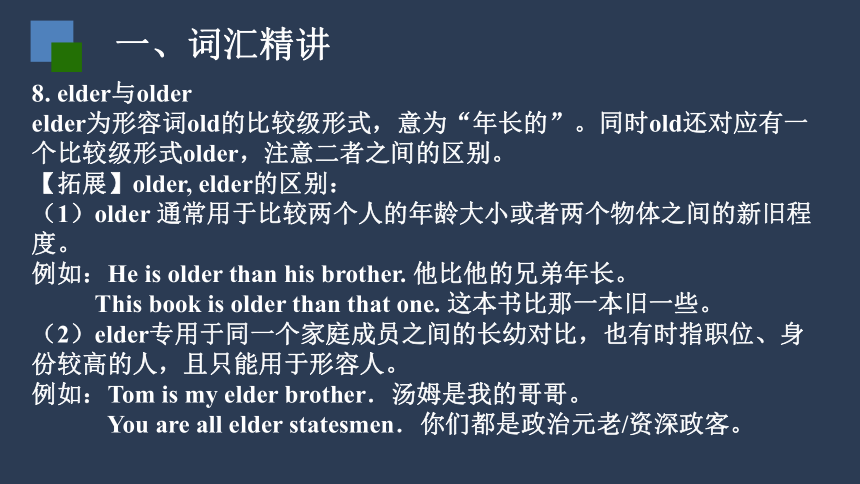
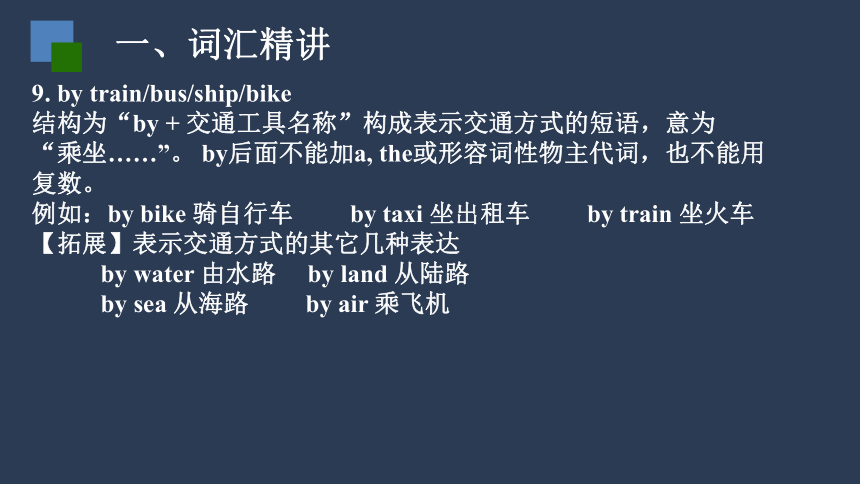
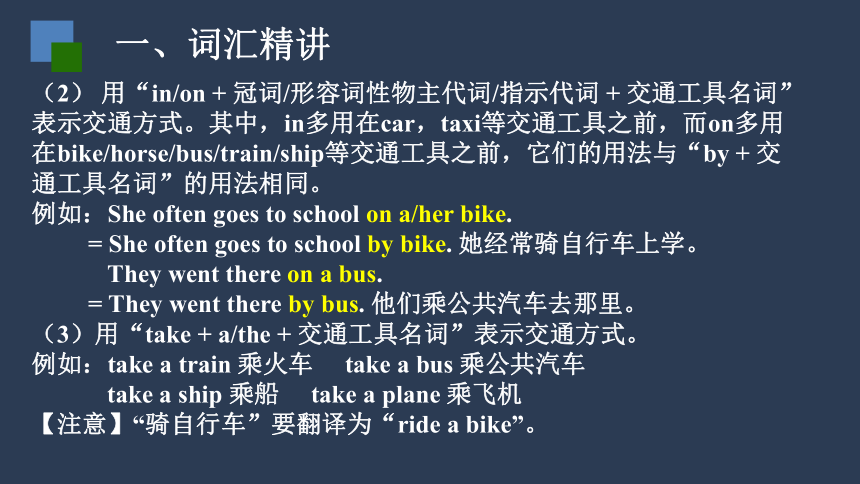
文档简介
课件37张PPT。译林版七年级下册 英语Unit 2 Neighbours
Revision1. like
like 作介词,意为“像;与……相似”,反义词为unlike。
短语look like表示“看起来像……”。
例如:Draw it like this! 照这样画! She looks like her mother. 她长得像她妈妈。
He has many hobbies like playing football and reading. 一、词汇精讲一、词汇精讲2. most of
most of意为“……中的大多数”,后面接可数名词复数作主语时,谓语动词用复数形式;也可接不可数名词,此时谓语动词用单数形式。
most girls=most of the girls (注意后面有the 前面要加of)
例如:Most of them are going off to Guangzhou next week.
他们中的多数人都准备下星期去广州。 Most of the water is clean.
大部分水是干净的。 Most of the apple is red. 这个苹果大部分是红的。 一、词汇精讲3. something与anything
something作不定代词,意为“某事,某物”,多用于肯定句中。在疑问句和否定句中常用anything;anything还有“任何事物”之意。 一些有趣的(事情) something interesting
例句:Is there anything interesting in today’s newspaper?
Something happens. 有事发生了。 I’d like something to eat. 我想吃点东西。 Is there anything wrong with his bike? 他自行车出问题了? Anything is possible. 一切皆有可能。一、词汇精讲【注意】(1)在很有礼貌的问某人要吃什么和喝什么时,应该使用something。这是一种特殊的用法。(委婉语气)
例如:Would you like something to drink? 想喝点什么吗?
(2)在表示请求、建议或征求意见的疑问句中常用some或something。
例如:Could I have some more cakes ?
在表达“任何”这一含义时肯定句中常用any或anything。
例如: I believe anything he says. 我相信他所说的任何话。一、词汇精讲4. ready
be ready to do ...意为“准备做某事/愿意(乐意)做某事”。
例如:He is always ready to help others. 他总是乐意帮助他人。
I’ll be ready to leave. 我准备离开。
【拓展】be/get ready for意为“为……做准备”(prepare for)。
例如:They are ready for the party. 他们为聚会做好了准备。
All the students are getting ready for the sports meeting.
所有学生都在为运动会做准备。 一、词汇精讲5. problem:问题,难题
have problems with something:在某方面有问题(困难)
have problems (in) doing something:做某事有问题(困难)
problem和question辨析
question指需要回答的问题 ask/answer the question
problem指困难,麻烦,难题
数学题/物理题Maths/physics problems
例句:Can you help me with my problems? 你能帮我解决我的问题吗?
一、词汇精讲6. fire
作不可数名词,意为“火”。
例如:Keep away from fire. 切勿近火。
make a fire是固定短语,意为“生火”。
例如: We can make a fire to keep the room warm.
我们可以生火让房间温暖起来。
【拓展】由make构成的词组有:
make noise发出噪音 make friends交朋友
make tea沏茶 make money赚钱
make a living谋生 make trouble 制造麻烦
make a sentence造句 make the bed铺床
make a decision决定 make a speech演讲一、词汇精讲7. job与work
work和job作名词是同义词,都有“工作、职业”的意思。不过,它们之间还是有些区别的。
(1)job是可数名词,指特定工作。work是不可数名词,泛指工作。我们可以说a job,不能说a work。
例如:Peter has a good job in a bank.
彼得在一家银行有份很好的工作。
Tom changed jobs many times. 汤姆换了很多工作。
Looking after three cats is not easy work.
照顾三只猫咪可不是件容易事。一、词汇精讲8. elder与older
elder为形容词old的比较级形式,意为“年长的”。同时old还对应有一个比较级形式older,注意二者之间的区别。
【拓展】older, elder的区别:
(1)older 通常用于比较两个人的年龄大小或者两个物体之间的新旧程度。
例如:He is older than his brother. 他比他的兄弟年长。
This book is older than that one. 这本书比那一本旧一些。
(2)elder专用于同一个家庭成员之间的长幼对比,也有时指职位、身份较高的人,且只能用于形容人。
例如:Tom is my elder brother.汤姆是我的哥哥。
You are all elder statesmen.你们都是政治元老/资深政客。 一、词汇精讲9. by train/bus/ship/bike
结构为“by + 交通工具名称”构成表示交通方式的短语,意为
“乘坐……”。 by后面不能加a, the或形容词性物主代词,也不能用 复数。
例如:by bike 骑自行车 by taxi 坐出租车 by train 坐火车
【拓展】表示交通方式的其它几种表达
by water 由水路 by land 从陆路
by sea 从海路 by air 乘飞机一、词汇精讲(2) 用“in/on + 冠词/形容词性物主代词/指示代词 + 交通工具名词”表示交通方式。其中,in多用在car,taxi等交通工具之前,而on多用在bike/horse/bus/train/ship等交通工具之前,它们的用法与“by + 交通工具名词”的用法相同。
例如:She often goes to school on a/her bike.
= She often goes to school by bike. 她经常骑自行车上学。
They went there on a bus.
= They went there by bus. 他们乘公共汽车去那里。
(3)用“take + a/the + 交通工具名词”表示交通方式。
例如:take a train 乘火车 take a bus 乘公共汽车
take a ship 乘船 take a plane 乘飞机
【注意】“骑自行车”要翻译为“ride a bike”。一、词汇精讲10. worry用法
(1)worry可用作不及物动词或及物动词。作及物动词时,意为“使烦恼,使担忧”。作不及物动词时,意为“发愁,担心,
烦恼”,常与介词about连用。
例如: Don’t worry about me/my lessons. 不要为我/我的功课担心。
(2) somebody worry about something =something worry somebody
例如:She worries about her weight= Her weight worries her.
她担忧她的体重/她的体重让她担忧
(3)worry about doing …/worry about not doing …为做某事担忧/忧虑不能做某事
例如:She always worries about not having enough time. 她总是担心没有足够时间 一、词汇精讲 11. afraid用法
(1)I’m afraid+句子 恐怕……
例如:I’m afraid they won’t welcome visitors like you.
I’m afraid so:恐怕是的 I’m afraid not: 恐怕不是的
(2) be afraid of …… 害怕某人/某东西
例如:Is she afraid of dogs? No, she isn’t. 她怕狗吗?不,她不怕。
(3)be afraid of doing something=be afraid to do something
例如:My little sister is afraid of going out alone at night.
我小妹妹害怕晚上独自外出。I. 根据汉语或首字母提示补全句子。
1. My house is next to Uncle Li’s. We are__________ (邻居). 2. My computer is __________ (损坏的). It doesn’t work. 3. Tom’s father is a __________ (邮递员). He works in a post office. 4. Lucy is older than Lily. She is Lily’s __________ (年长的) sister. 5. The boy feels __________ (恶心的). We must send him to hospital. 6. These books are ___________ (有用的,有帮助的) to the children. 7. Whose homework is ___________ (更好的), Tom’s or Lily’s?neighboursbrokenpostmaneldersickhelpfulbetter二、词汇精练二、词汇精练8. Let’s __________ (修理) the bike for her.
9. You’re ___________ (幸运的) to have your own bedroom.
10. He moves and talks ___________ (像) his father.
11. Don’t w_______ about him. He can do it well.
12. He is always r____________ to help others. He is a good person.
13. He got a j_____ as a waiter in a restaurant.
14. Excuse me. Can you tell me the way to the police s_____________? repair / fix luckylikeorryeadyobtation二、词汇精练II. 从方框中选择恰当短语并用其适当形式填空。
make a fire, be ready to, do some shopping, by train,
in the future, worry about
1. Miss Yang often _____________________ at the weekend.
2. There will be no school ______________.
3. We will go to Qingdao ______________ to visit my grandparents.
4. Let’s ______________ to make the room warm.
5. I ______________ help others.
6. Don’t ______________ your son. He is healthy now. in the futuredoes some shoppingby trainmake a fiream ready toworry about三、句式精讲1. Where are you going?(现在进行时表将来)
be going此处为“现在进行时表将来”。现在进行时表将来主要用于表示按计划或安排将要发生的动作,常有“意图”、“安排”或“打算”的含义。go, come, leave等表示位移的动词,都可以用于现在进行时表将来。
例如:He is going. 他要走了。
I’m coming. 我要来了。
Tom is leaving. 汤姆要走了。 三、句式精讲2. I’m ready to help ... with …
help somebody with something. 意为“帮助某人做某事”。
例如:I have to help my parents with the housework.
我得帮助我的父母做家务。
Can you help me with the work?
你能帮助我做这项工作吗?三、句式精讲【拓展】与help相关的固定用法:
(1)help somebody (to) do something 意为“帮助某人做某事”。
例如:Sometimes I help my mother do the cooking.
有时候我帮我母亲做饭。
(2)help oneself (to)意为“自用(食物)等”。
例如:Help yourself to some fish. 请随便吃些鱼。
(3)with the help of…意为“在……的帮助下”。此处help作名词。
例如:With the help of her, he found his lost child.
在她的帮助下,他找到了他失踪的孩子。三、句式精讲3. There is something wrong with …….
该句型意为“某物坏(失灵)了”。
相当于Something is not working well.,
还可以用Something is broken.替换。
例如:There is something wrong with my watch.
我的手表坏了。
There is something wrong with my eyes.
我的眼睛出毛病了。三、句式精讲【拓展】There is nothing wrong with …...
“某物没有坏/出毛病”。
Is there anything wrong with …...
“某物出故障了吗?”
例如:There is nothing wrong with your computer.
你的电脑没问题。
Is there anything wrong with my legs?
我的腿有毛病吗? 三、句式精讲4. You’re welcome.
You’re welcome.意为“不用谢”。是对别人致谢时的答语。
与其用法相同的还有:
That’s all right. /That ’s OK./Not at all.等。
例如:— Thanks for your help. 谢谢你的帮助。
— You’re welcome. 不用谢。
【拓展】welcome也可作动词,表示“欢迎”。
例如:They welcomed him with flowers.
他们用鲜花欢迎他的到来。重要词组住在九楼live on the ninth floor在小区周围around the neighbourhood够幸运住在这样的小区里be lucky enough to live in a neighbourhood like this乐意帮我们解决各种各样的问题be ready to help us with all kinds of problems请电脑工程师修理这台破电脑ask a computer engineer to fix this broken computer 为他们购物 do some shopping for them 重要词组等待我们回电wait for us to call back 开会迟到be late for the meeting生火取暖make a fire to keep warm在家北面的警察局上班work in a police station north of his home一个上班族an office worker 听起来像个好主意sound like a good idea听起来不错/感觉身体不错sound good/feel well保持忙碌 keep busy四、句式精练I. 句型转换,按要求完成下列句子。
1. Your mother is always worried about your English. (改为同义句)
Your mother always _______ _______ your English.
2. There is something wrong with your computer. (改成一般疑问句)
_______ _______ _______ wrong with your computer?
3. Mary goes to school by bike every day. (对划线部分提问)
_______ _______ Mary _______ to school every day?
4. Tom often helps Miss Li do housework. (改为同义句)
Tom often _______ Miss Li _______ housework.
5. I will go to dance this evening. (改为同义句)
I _______ _______ _______ dance this evening. worries about Is there anything How does go helps with am going to四、句式精练II. 根据汉语提示,完成句子。
1. 温迪的家有五口人。
_______ _______ five people in Wendy’s family.
2. 你打算在将来做什么。
What are you going to be _______ _______ _______?
3. 我打算成为一名电脑工程师。
I’m _______ _______ _______ a computer engineer.
4. 我的汽车坏了,我打算请一位汽车工程师检查一下。
There is __________ _____ _____ my car. I’m going _____ ______ an
engineer ______ ______ it.
5. —谢谢你的帮助!—不客气。
—Thank you _______ your help! —You’re ________. There are in the future going to be something wrong with to askto checkforwelcome五、语法巩固:一般将来时用法讲解
(一)基本概念
表示将来某个时间要发生的动作或存在的状态,常与一些表示将来的时间状语连用。
例如:I am going to / will watch a football match on TV this evening.
今天晚上我将在电视上看一场足球比赛。 五、语法巩固:一般将来时(二)基本结构
一般将来时的结构一般由“助动词will/shall+动词原形”或“be going to+动词原形”构成。
will/shall是助动词,不能独立使用, 后面紧跟动词原形,在名词或代词后常简缩为’ll,并与主语连写在一起。
will的否定形式是will not,缩略形式是won’t。
Shall 的否定形式是shall not, 缩略形式是shan’t五、语法巩固:一般将来时(三)时间状语
一般将来时常用的时间状语:tomorrow, tonight, the day after tomorrow, next +时间, this afternoon, this evening, soon, in the year 2010, in the future, from now on, coming, in + 时间段等。
例如:Tom will come back in two days.汤姆两天后回来。
I’ll be more careful from now on. 从现在起我会更加小心的。 五、语法巩固:一般将来时(四)注意的问题
主语是第一人称I; we 时,常用助动词 shall + 动词原形。否定形式是shall 后加not构成,shall not可缩写成shan’t。
当主语是第一人称时,陈述句既可以用will, 也可以用shall。疑问句一般只能用shall
例如:We shall/will be very happy if you accept it.
如果你接受了它,我们将会很高兴。
I shall/will write you a letter next month. 下个月我会给你写信。
Shall we meet at the school gate tomorrow?
明天我们将在学校 大门口见面吗?
五、语法巩固:一般将来时在有条件从句的主句中,一般不用 be going to, 而多用will。
例如:We’ll have a picnic if my father is free.
如果我父亲有空,我们会去野餐。
be going to 表示根据目前迹象推断将要发生的事情,而在没有迹象表明的情况下进行的猜测用“will和be going to”皆可。
例如:Look at the clouds. It’s going to rain.
你看天上的云。快下雨了。
My God! We are going to crash. 天哪!我们快撞车了。
It’s nine o’clock now. I am going to be late. 九点了,我要迟到了。六、语法精练II. 用所给动词的适当形式填空。
1. Today is a sunny day. We _______________ (have) a picnic this afternoon.
2. Tom often ____________ (go) to school on foot. But today is raining.
3. —What does he usually do at weekends?
—He usually ________ (watch) TV and __________ (catch) insects(昆虫)?
4. —It’s Friday today. What is she going to do this weekend?
—She ______________ (watch) TV and _________ (catch) insects.
5. Who _________________ (speak) at tomorrow’s meeting? Jim is. are going to havegoeswatchescatchesis going to watchcatchis going to speak六、语法精练III. 句式转换,每空一词。
1. Nancy is going camping.(改为否定句)
Nancy ________ going camping.
2. I’ll go and join them.(改为否定句)
I _______ go ______ join them.
3. I’m going to get up at 6:30 tomorrow.(改为一般疑问句)
________ _______ ________ to get up at 6:30 tomorrow?
4. We will meet at the bus stop at 10:30.(改为一般疑问句)
_______ ________ meet at the bus stop at 10:30?
5. She is going to listen to music after school.(对划线部分提问)
________ ______ she ________ ______ _______ after school?isn’twon’t orAre you going Shall weWhat is going to do 六、语法精练6. My father and mother are going to see a play the day after tomorrow.
(对划线部分提问) _________ _________ ________ father and mother going to see a play? 7. We are going to play ping-pong on Saturday.
(改为一般疑问句并作否定回答) — __________ __________ going to play ping-pong on Saturday? — __________, we __________. 8. He’s going to tell me all about it. (改为否定句) He _________ _________ going to tell me all about it. 9. She is going to work hard at English this term. (对划线部分提问) _________ she ________ this term? 10. They’re going to the Sun Island by bus. (对划线部分提问) ________ ________ they ________ ________ the Sun Island? When are your Are you No aren’t is notWhat’ll do How are going toHomework:认真复习第二单元。
完成一份课后练习。
Revision1. like
like 作介词,意为“像;与……相似”,反义词为unlike。
短语look like表示“看起来像……”。
例如:Draw it like this! 照这样画! She looks like her mother. 她长得像她妈妈。
He has many hobbies like playing football and reading. 一、词汇精讲一、词汇精讲2. most of
most of意为“……中的大多数”,后面接可数名词复数作主语时,谓语动词用复数形式;也可接不可数名词,此时谓语动词用单数形式。
most girls=most of the girls (注意后面有the 前面要加of)
例如:Most of them are going off to Guangzhou next week.
他们中的多数人都准备下星期去广州。 Most of the water is clean.
大部分水是干净的。 Most of the apple is red. 这个苹果大部分是红的。 一、词汇精讲3. something与anything
something作不定代词,意为“某事,某物”,多用于肯定句中。在疑问句和否定句中常用anything;anything还有“任何事物”之意。 一些有趣的(事情) something interesting
例句:Is there anything interesting in today’s newspaper?
Something happens. 有事发生了。 I’d like something to eat. 我想吃点东西。 Is there anything wrong with his bike? 他自行车出问题了? Anything is possible. 一切皆有可能。一、词汇精讲【注意】(1)在很有礼貌的问某人要吃什么和喝什么时,应该使用something。这是一种特殊的用法。(委婉语气)
例如:Would you like something to drink? 想喝点什么吗?
(2)在表示请求、建议或征求意见的疑问句中常用some或something。
例如:Could I have some more cakes ?
在表达“任何”这一含义时肯定句中常用any或anything。
例如: I believe anything he says. 我相信他所说的任何话。一、词汇精讲4. ready
be ready to do ...意为“准备做某事/愿意(乐意)做某事”。
例如:He is always ready to help others. 他总是乐意帮助他人。
I’ll be ready to leave. 我准备离开。
【拓展】be/get ready for意为“为……做准备”(prepare for)。
例如:They are ready for the party. 他们为聚会做好了准备。
All the students are getting ready for the sports meeting.
所有学生都在为运动会做准备。 一、词汇精讲5. problem:问题,难题
have problems with something:在某方面有问题(困难)
have problems (in) doing something:做某事有问题(困难)
problem和question辨析
question指需要回答的问题 ask/answer the question
problem指困难,麻烦,难题
数学题/物理题Maths/physics problems
例句:Can you help me with my problems? 你能帮我解决我的问题吗?
一、词汇精讲6. fire
作不可数名词,意为“火”。
例如:Keep away from fire. 切勿近火。
make a fire是固定短语,意为“生火”。
例如: We can make a fire to keep the room warm.
我们可以生火让房间温暖起来。
【拓展】由make构成的词组有:
make noise发出噪音 make friends交朋友
make tea沏茶 make money赚钱
make a living谋生 make trouble 制造麻烦
make a sentence造句 make the bed铺床
make a decision决定 make a speech演讲一、词汇精讲7. job与work
work和job作名词是同义词,都有“工作、职业”的意思。不过,它们之间还是有些区别的。
(1)job是可数名词,指特定工作。work是不可数名词,泛指工作。我们可以说a job,不能说a work。
例如:Peter has a good job in a bank.
彼得在一家银行有份很好的工作。
Tom changed jobs many times. 汤姆换了很多工作。
Looking after three cats is not easy work.
照顾三只猫咪可不是件容易事。一、词汇精讲8. elder与older
elder为形容词old的比较级形式,意为“年长的”。同时old还对应有一个比较级形式older,注意二者之间的区别。
【拓展】older, elder的区别:
(1)older 通常用于比较两个人的年龄大小或者两个物体之间的新旧程度。
例如:He is older than his brother. 他比他的兄弟年长。
This book is older than that one. 这本书比那一本旧一些。
(2)elder专用于同一个家庭成员之间的长幼对比,也有时指职位、身份较高的人,且只能用于形容人。
例如:Tom is my elder brother.汤姆是我的哥哥。
You are all elder statesmen.你们都是政治元老/资深政客。 一、词汇精讲9. by train/bus/ship/bike
结构为“by + 交通工具名称”构成表示交通方式的短语,意为
“乘坐……”。 by后面不能加a, the或形容词性物主代词,也不能用 复数。
例如:by bike 骑自行车 by taxi 坐出租车 by train 坐火车
【拓展】表示交通方式的其它几种表达
by water 由水路 by land 从陆路
by sea 从海路 by air 乘飞机一、词汇精讲(2) 用“in/on + 冠词/形容词性物主代词/指示代词 + 交通工具名词”表示交通方式。其中,in多用在car,taxi等交通工具之前,而on多用在bike/horse/bus/train/ship等交通工具之前,它们的用法与“by + 交通工具名词”的用法相同。
例如:She often goes to school on a/her bike.
= She often goes to school by bike. 她经常骑自行车上学。
They went there on a bus.
= They went there by bus. 他们乘公共汽车去那里。
(3)用“take + a/the + 交通工具名词”表示交通方式。
例如:take a train 乘火车 take a bus 乘公共汽车
take a ship 乘船 take a plane 乘飞机
【注意】“骑自行车”要翻译为“ride a bike”。一、词汇精讲10. worry用法
(1)worry可用作不及物动词或及物动词。作及物动词时,意为“使烦恼,使担忧”。作不及物动词时,意为“发愁,担心,
烦恼”,常与介词about连用。
例如: Don’t worry about me/my lessons. 不要为我/我的功课担心。
(2) somebody worry about something =something worry somebody
例如:She worries about her weight= Her weight worries her.
她担忧她的体重/她的体重让她担忧
(3)worry about doing …/worry about not doing …为做某事担忧/忧虑不能做某事
例如:She always worries about not having enough time. 她总是担心没有足够时间 一、词汇精讲 11. afraid用法
(1)I’m afraid+句子 恐怕……
例如:I’m afraid they won’t welcome visitors like you.
I’m afraid so:恐怕是的 I’m afraid not: 恐怕不是的
(2) be afraid of …… 害怕某人/某东西
例如:Is she afraid of dogs? No, she isn’t. 她怕狗吗?不,她不怕。
(3)be afraid of doing something=be afraid to do something
例如:My little sister is afraid of going out alone at night.
我小妹妹害怕晚上独自外出。I. 根据汉语或首字母提示补全句子。
1. My house is next to Uncle Li’s. We are__________ (邻居). 2. My computer is __________ (损坏的). It doesn’t work. 3. Tom’s father is a __________ (邮递员). He works in a post office. 4. Lucy is older than Lily. She is Lily’s __________ (年长的) sister. 5. The boy feels __________ (恶心的). We must send him to hospital. 6. These books are ___________ (有用的,有帮助的) to the children. 7. Whose homework is ___________ (更好的), Tom’s or Lily’s?neighboursbrokenpostmaneldersickhelpfulbetter二、词汇精练二、词汇精练8. Let’s __________ (修理) the bike for her.
9. You’re ___________ (幸运的) to have your own bedroom.
10. He moves and talks ___________ (像) his father.
11. Don’t w_______ about him. He can do it well.
12. He is always r____________ to help others. He is a good person.
13. He got a j_____ as a waiter in a restaurant.
14. Excuse me. Can you tell me the way to the police s_____________? repair / fix luckylikeorryeadyobtation二、词汇精练II. 从方框中选择恰当短语并用其适当形式填空。
make a fire, be ready to, do some shopping, by train,
in the future, worry about
1. Miss Yang often _____________________ at the weekend.
2. There will be no school ______________.
3. We will go to Qingdao ______________ to visit my grandparents.
4. Let’s ______________ to make the room warm.
5. I ______________ help others.
6. Don’t ______________ your son. He is healthy now. in the futuredoes some shoppingby trainmake a fiream ready toworry about三、句式精讲1. Where are you going?(现在进行时表将来)
be going此处为“现在进行时表将来”。现在进行时表将来主要用于表示按计划或安排将要发生的动作,常有“意图”、“安排”或“打算”的含义。go, come, leave等表示位移的动词,都可以用于现在进行时表将来。
例如:He is going. 他要走了。
I’m coming. 我要来了。
Tom is leaving. 汤姆要走了。 三、句式精讲2. I’m ready to help ... with …
help somebody with something. 意为“帮助某人做某事”。
例如:I have to help my parents with the housework.
我得帮助我的父母做家务。
Can you help me with the work?
你能帮助我做这项工作吗?三、句式精讲【拓展】与help相关的固定用法:
(1)help somebody (to) do something 意为“帮助某人做某事”。
例如:Sometimes I help my mother do the cooking.
有时候我帮我母亲做饭。
(2)help oneself (to)意为“自用(食物)等”。
例如:Help yourself to some fish. 请随便吃些鱼。
(3)with the help of…意为“在……的帮助下”。此处help作名词。
例如:With the help of her, he found his lost child.
在她的帮助下,他找到了他失踪的孩子。三、句式精讲3. There is something wrong with …….
该句型意为“某物坏(失灵)了”。
相当于Something is not working well.,
还可以用Something is broken.替换。
例如:There is something wrong with my watch.
我的手表坏了。
There is something wrong with my eyes.
我的眼睛出毛病了。三、句式精讲【拓展】There is nothing wrong with …...
“某物没有坏/出毛病”。
Is there anything wrong with …...
“某物出故障了吗?”
例如:There is nothing wrong with your computer.
你的电脑没问题。
Is there anything wrong with my legs?
我的腿有毛病吗? 三、句式精讲4. You’re welcome.
You’re welcome.意为“不用谢”。是对别人致谢时的答语。
与其用法相同的还有:
That’s all right. /That ’s OK./Not at all.等。
例如:— Thanks for your help. 谢谢你的帮助。
— You’re welcome. 不用谢。
【拓展】welcome也可作动词,表示“欢迎”。
例如:They welcomed him with flowers.
他们用鲜花欢迎他的到来。重要词组住在九楼live on the ninth floor在小区周围around the neighbourhood够幸运住在这样的小区里be lucky enough to live in a neighbourhood like this乐意帮我们解决各种各样的问题be ready to help us with all kinds of problems请电脑工程师修理这台破电脑ask a computer engineer to fix this broken computer 为他们购物 do some shopping for them 重要词组等待我们回电wait for us to call back 开会迟到be late for the meeting生火取暖make a fire to keep warm在家北面的警察局上班work in a police station north of his home一个上班族an office worker 听起来像个好主意sound like a good idea听起来不错/感觉身体不错sound good/feel well保持忙碌 keep busy四、句式精练I. 句型转换,按要求完成下列句子。
1. Your mother is always worried about your English. (改为同义句)
Your mother always _______ _______ your English.
2. There is something wrong with your computer. (改成一般疑问句)
_______ _______ _______ wrong with your computer?
3. Mary goes to school by bike every day. (对划线部分提问)
_______ _______ Mary _______ to school every day?
4. Tom often helps Miss Li do housework. (改为同义句)
Tom often _______ Miss Li _______ housework.
5. I will go to dance this evening. (改为同义句)
I _______ _______ _______ dance this evening. worries about Is there anything How does go helps with am going to四、句式精练II. 根据汉语提示,完成句子。
1. 温迪的家有五口人。
_______ _______ five people in Wendy’s family.
2. 你打算在将来做什么。
What are you going to be _______ _______ _______?
3. 我打算成为一名电脑工程师。
I’m _______ _______ _______ a computer engineer.
4. 我的汽车坏了,我打算请一位汽车工程师检查一下。
There is __________ _____ _____ my car. I’m going _____ ______ an
engineer ______ ______ it.
5. —谢谢你的帮助!—不客气。
—Thank you _______ your help! —You’re ________. There are in the future going to be something wrong with to askto checkforwelcome五、语法巩固:一般将来时用法讲解
(一)基本概念
表示将来某个时间要发生的动作或存在的状态,常与一些表示将来的时间状语连用。
例如:I am going to / will watch a football match on TV this evening.
今天晚上我将在电视上看一场足球比赛。 五、语法巩固:一般将来时(二)基本结构
一般将来时的结构一般由“助动词will/shall+动词原形”或“be going to+动词原形”构成。
will/shall是助动词,不能独立使用, 后面紧跟动词原形,在名词或代词后常简缩为’ll,并与主语连写在一起。
will的否定形式是will not,缩略形式是won’t。
Shall 的否定形式是shall not, 缩略形式是shan’t五、语法巩固:一般将来时(三)时间状语
一般将来时常用的时间状语:tomorrow, tonight, the day after tomorrow, next +时间, this afternoon, this evening, soon, in the year 2010, in the future, from now on, coming, in + 时间段等。
例如:Tom will come back in two days.汤姆两天后回来。
I’ll be more careful from now on. 从现在起我会更加小心的。 五、语法巩固:一般将来时(四)注意的问题
主语是第一人称I; we 时,常用助动词 shall + 动词原形。否定形式是shall 后加not构成,shall not可缩写成shan’t。
当主语是第一人称时,陈述句既可以用will, 也可以用shall。疑问句一般只能用shall
例如:We shall/will be very happy if you accept it.
如果你接受了它,我们将会很高兴。
I shall/will write you a letter next month. 下个月我会给你写信。
Shall we meet at the school gate tomorrow?
明天我们将在学校 大门口见面吗?
五、语法巩固:一般将来时在有条件从句的主句中,一般不用 be going to, 而多用will。
例如:We’ll have a picnic if my father is free.
如果我父亲有空,我们会去野餐。
be going to 表示根据目前迹象推断将要发生的事情,而在没有迹象表明的情况下进行的猜测用“will和be going to”皆可。
例如:Look at the clouds. It’s going to rain.
你看天上的云。快下雨了。
My God! We are going to crash. 天哪!我们快撞车了。
It’s nine o’clock now. I am going to be late. 九点了,我要迟到了。六、语法精练II. 用所给动词的适当形式填空。
1. Today is a sunny day. We _______________ (have) a picnic this afternoon.
2. Tom often ____________ (go) to school on foot. But today is raining.
3. —What does he usually do at weekends?
—He usually ________ (watch) TV and __________ (catch) insects(昆虫)?
4. —It’s Friday today. What is she going to do this weekend?
—She ______________ (watch) TV and _________ (catch) insects.
5. Who _________________ (speak) at tomorrow’s meeting? Jim is. are going to havegoeswatchescatchesis going to watchcatchis going to speak六、语法精练III. 句式转换,每空一词。
1. Nancy is going camping.(改为否定句)
Nancy ________ going camping.
2. I’ll go and join them.(改为否定句)
I _______ go ______ join them.
3. I’m going to get up at 6:30 tomorrow.(改为一般疑问句)
________ _______ ________ to get up at 6:30 tomorrow?
4. We will meet at the bus stop at 10:30.(改为一般疑问句)
_______ ________ meet at the bus stop at 10:30?
5. She is going to listen to music after school.(对划线部分提问)
________ ______ she ________ ______ _______ after school?isn’twon’t orAre you going Shall weWhat is going to do 六、语法精练6. My father and mother are going to see a play the day after tomorrow.
(对划线部分提问) _________ _________ ________ father and mother going to see a play? 7. We are going to play ping-pong on Saturday.
(改为一般疑问句并作否定回答) — __________ __________ going to play ping-pong on Saturday? — __________, we __________. 8. He’s going to tell me all about it. (改为否定句) He _________ _________ going to tell me all about it. 9. She is going to work hard at English this term. (对划线部分提问) _________ she ________ this term? 10. They’re going to the Sun Island by bus. (对划线部分提问) ________ ________ they ________ ________ the Sun Island? When are your Are you No aren’t is notWhat’ll do How are going toHomework:认真复习第二单元。
完成一份课后练习。
